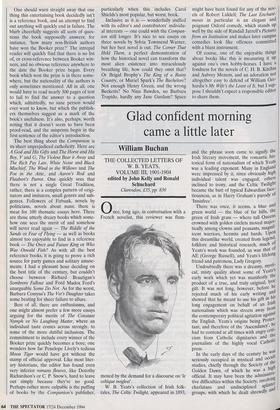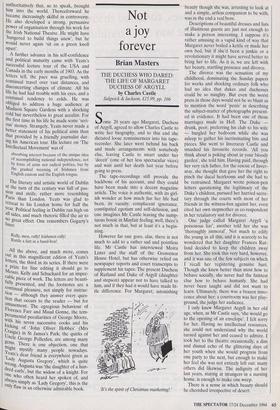Glad confident morning came a little later
William Buchan
THE COLLECTED LETTERS OF W. B. YEATS, VOLUME III, 1901-1904 edited by John Kelly and Ronald Selluchard Clarendon, £35, pp. 830 Once, long ago, in conversation with a French novelist, this reviewer was flum- moxed by the demand for a discourse on 'le celtique twigleet'.
W. B. Yeats's collection of Irish folk- tales, The Celtic Twilight, appeared in 1893, and the phrase soon came to signify the Irish literary movement, the romantic his- torical form of nationalism of which Yeats was a leading exponent. Many in England were impressed by it, since obviously high individual talent was engaged; others inclined to irony, and the Celtic Twilight became the butt of typical Edwardian face- tiousness, as in Harry Graham's parody of Innisfree'. There was once, it seems, a blue and green world — the blue of far hills, the green of Irish grass — where tall Queens crowned with golden circlets moved majes- tically among clowns and peasants, maginf° icent warriors, hermits and bards. Upon this dreamlike world, created from legend folklore and historical research, much of work was founded, as was that of AE (George Russell), and Yeats's lifelong friend and patroness, Lady Gregory. Undoubtedly there was a dreamy, mysti- cal, misty quality about some of Yeats s early work which yet was manifestly the product of a true, and truly original, trite gift. It was not long, however, before he rejected much of his early writing and showed that he meant to use his gift in his long engagement on behalf of an Irish nationalism which was streets away from the contemporary political agitation against the English. Yeats's origins being Protes- tant, and therefore of the 'Ascendancy', he had to contend at all times with angry entl. cism from Catholic dignitaries and the journalists of the highly vocal Catholic press. In the early days of the century he via.s seriously occupied in mystical and occult studies, chiefly through the Society of the Golden Dawn, of which he was a .he official. It may have been the admilustr3 tive difficulties within the Society, involute charlatans and undisciplined sp1Mte, groups, with which he dealt shrewdly al° authoritatively that, so to speak, brought him into the world. Thenceforward he became increasingly skilful in controversy. He also developed a strong, persuasive power of organisation through his work for the Irish National Theatre. He might have `hungered to build things anew', but he would never again 'sit on a green knoll apart'.
A further advance in his self-confidence and political maturity came with Yeats's successful lecture tour of the USA and Canada in the early months of 1903. As the letters tell, the pace was gruelling, with continual travel over vast distances, and disconcerting changes of climate. All his life he had had trouble with his eyes, and a continual tendency to colds. He was obliged to address a huge audience at Madison Square Gardens with a shocking cold but nevertheless to great accalim. For the first time in his life he made some 'seri- ous' money. Strangely, Yeats never made a better statement of his political aims than that provided by a friendly journalist dur- lug his American tour. His lecture on 'The Intellectual Movement' was of
absorbing interest because of the unique idea of accomplishing national independence, not by force of arms nor radical politics, but by the gradual weaning of Irishmen from English custom and the English tongue.
The literary and artistic world of Dublin at the turn of the century was full of pas- sion and strife, rather more resembling Paris than London. Yeats was glad to retreat to his London home for half the Year. Political feeling in Dublin ran high on all sides, and much rhetoric filled the air to no great effect. One remembers Gogarty's lines:
Rally, men, rally! Irishmen rally! Rattle a fart in a band-box!
All the above, and much more, comes out in this magnificent edition of Yeats's letters, the third in its series. If there were a Prize for fine editing it should go to Messrs. Kelly and Schuchard for an impec- cable piece of work. The letters are beauti- fully presented, and the footnotes are a continual pleasure, not simply for instruc- tion — although they answer every ques- tion that occurs to the reader — but for amusement. The egregious behaviour of Florence Farr and Maud Gonne, the tem- peramental peculiarities of George Moore, with his seven successive cooks and his kicking of 'John Oliver Hobbes' (Mrs Craigie) in St James's Park; the quirks of Uncle George Pollexfen, are among many gen.'s. There is one objection, one that might mystify many people nowadays. Yeats's dear friend is everywhere given as Lady Augusta Gregory', which is quite wrong. Augusta was 'the daughter of a hun- dred earls', but the widow of a knight. For One who often heard her spoken of, and always simply as 'Lady Gregory', this is the Only flaw in an otherwise admirable book.











































































































 Previous page
Previous page